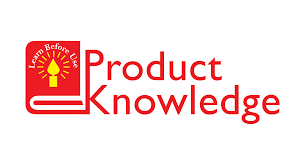
Good product knowledge engages curious customers as well as carves out a space for your product in the marketplace. If a staff of a company is ignorant of how his or her company’s product helps solve this or that problem, the staff would be unable to convince customers by relating the company’s product to their needs. Hence, he or she would fail to persuade them to buy.
Product knowledge transparency requires every employee to have information such as a good knowledge of what they are selling, customer insights, competitors’ analysis and product value statements at their finger tips. Therefore, product knowledge helps turn a company’s staff into an enthusiastic expert who knows how and whom to sell the company’s product to.
What is Product Knowledge?

Product knowledge means that an employee is highly knowledgeable about a product’s features and can clearly explain its benefits to a customer.
Thus, product knowledge is a deep understanding of products or services a company offers, including features, functionality, benefits, pricing, target customers, industry policies and special offers.
Furthermore, Product knowledge is not restricted to the product itself, but includes information on external factors such as industry trends, brand values, competitors, and customer experience that influence the customers’ final decision.
Read the types of Product Knowledge
Importance of Product Knowledge in an Organisation
Every role in an organization that is involved in creating, marketing, selling, or servicing product needs product knowledge because it helps foster collaboration and innovation. Therefore, below are the importances of Product Knowledge in an Organisation.
i) Importance of Product Knowledge to Product Managers:
Product Managers track the growth of the product in line with customer feedback. Therefore, Product knowledge guides product managers to effectively develop and improve products bearing in mind the information they gather from customer feedback and market research.
It is also important to their work because it makes it possible for them to empathize with the customers and satisfy their needs.
In addition, product managers need detailed product knowledge to relate the product vision and roadmap to internal and external stakeholders.
ii) Importance of Product Knowledge to Product Developers:
Good product knowledge serves as a foundational basis for product developers to understand the technical aspects of products and how it solves customer problems. With this, they can remodel the product when necessary to ensure quality and functionality.
iii) Importance of Product Knowledge to Product Designers:
With good product knowledge, product designers can create user-friendly and appealing interfaces that match the product’s features and benefits. Product designers also test their designs based on user feedback and data.
iv) Importance of Product Knowledge to Product Marketers:
Product marketers need product knowledge to create effective campaigns and contents that can make the target audience to see value in their product, to position their product as a viable solution to their problems and to propel them to choose their product at the expense of their competitors.
v) Importance of Product Knowledge to Salespeople:
Salespeople ought to have product knowledge to convince their customers to make buying decision because customers are more attracted to reliability, trust, and confidence.
Salespeople need to have a thorough knowledge of how their product can meet the customer’s needs, of the edge their product has over their competitors and why their target audience should prefer their product over competing products.
So, salespeople are required to have product knowledge that includes facts, figures and benefits of the product to provide accurate information, boost enthusiasm and encourage sales, build trust with customers, and make a lasting impression. Hence, product knowledge can help salespeople deliver better service to your existing customers and attract new ones.
vi) Importance of Product Knowledge to Customer service representatives:
Customer service representatives interface with customers on different levels therefore they need good product knowledge to provide support and guidance to existing customers who have challenges or concerns about the product. Their knowledge determines whether they can provide satisfactory answers to the customer’s questions and problems.
Therefore, with solid product knowledge, customer service representatives can confidently communicate accurate solutions to customers. So, product knowledge improves customer service experience and helps them to win customers and their confidence in the brand.
vii) Importance of Product Knowledge to Leaders and Stakeholders:
Leaders and Stakeholders need product knowledge to set strategic goals and direction for the organization based on the product’s potential and performance. They also need to inspire and motivate their teams by sharing the product’s vision and mission.
Read the Benefits of Product Knowledge
Ways to Grow and Improve Product Knowledge in an Organisation

Product knowledge is supposed to be repetitive because employees ought to constantly grow and improve as the product evolves and the organization acquires new customers. Therefore, below are ways to grow and improve product knowledge.
i) Offer hands-on experiences:
Using the product will help employees discover its strengths and weaknesses, its advantages and disadvantages, its features and benefits. Therefore, employees can empathize with customers better by experiencing what they experience while using the product.
ii) Conduct Research:
Reading product specifications, industry reports, and market research enable employees to understand the products and market better. Research gives companies the opportunity to learn about the product and developments that affect their product or market. This can be achieved by reading industry blogs, magazines, newsletters, reports, etc. It can also be achieved by attending industry events such as webinars, conferences, workshops, etc.
iii) Use customers feedback:
To gain valuable insights into how customers perceive products and where improvements can be made, companies need Customer feedback. Feedback can be gotten from different sources such as surveys, reviews, testimonials, social media forums, etc.
Utilizing customers’ feedback can help companies improve their product knowledge and develop better products that meet customer needs. Therefore, it is necessary to listen to what customers have to say about the product. To also understand customers needs, pain points, expectations, satisfaction levels, etc companies can have a direct conversation with them through phone calls, emails, chats, etc.
iv) Get insight from competitors:
Studying and comparing the product with competitors open companies to the opportunity of knowing what competitors are doing with their products. Several criteria are considered while studying and comparing the product with competitors such as features, price, quality, design etc. This also requires analyzing their marketing strategies, sales tactics, customer service practices, etc. With the insight gotten from competitors’ activities, companies will be able to identify their unique selling points and areas for improvement.
v) Collaborate with other departments:
Valuable insights into customer needs, preferences, and pain points can be gotten by collaborating with other departments, such as sales, marketing, and customer service. The information gotten can improve product knowledge and tailor products to meet customer needs.
vi) Hold Training outside the office environment:
Training employees outside their typical environment in a well-equipped training centre like CREM’s Training Facility can make learning more fun and engaging because the new environment can become a motivating factor to enhance their learning. Also they can be sent for open trainings where they can network and earn valuable industry knowledge.
Product Knowledge Training
Employees usually go through product knowledge training to learn how to answer customers’ doubts and questions and to assure them that their products/services are the best solutions to their needs. Product knowledge training can be done in various ways such as:
i) Taking courses online:
Online courses can be created to cover different aspects of the products such as the product’s history, vision, features, benefits, use cases, etc. This can be done in different formats such as videos, slides, quizzes, games, etc. With this, companies can access the employees’ progress and test their knowledge using online tools.
ii) Live sessions:
Live session is another product knowledge training method where an expert explains and demonstrates the product in real-time with various online platforms such as Zoom, Skype, Teams, etc. Room for questions and feedback are allowed during the session for clarity and understanding.
iii) Training on the Job:
Mentors and coaches can monitor and guide employees as they learn on-the-job during the process of production and interacting with customers.
iv) Knowledge sharing from peers:
Peer learning can be encouraged to give team members the avenue to share their experiences and insights with others. This increases engagement, promotes active listening and learning, and encourages collaboration among team members. Furthermore, this can be done using different online channels like emails, social media groups, etc. Communities of practice can also be created for the employees to discuss best practices and challenges related to the product.
In conclusion, product knowledge training should be ongoing and adaptive as the product changes and grows over time. You should also evaluate its effectiveness by measuring its impact on key performance indicators such as sales volume, customer satisfaction, employee engagement, etc.

